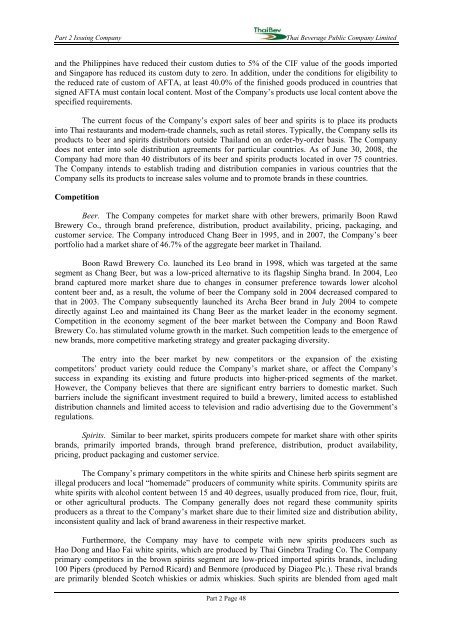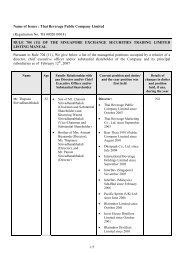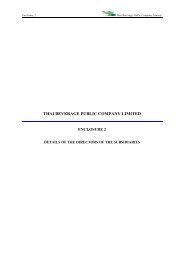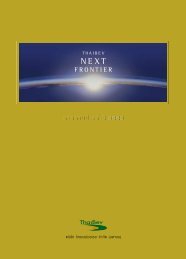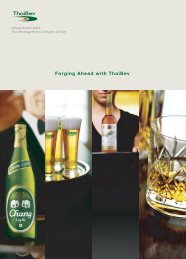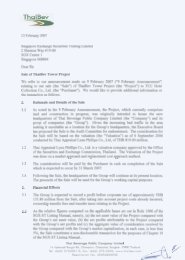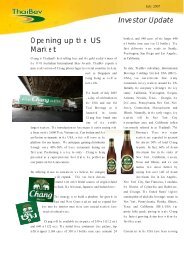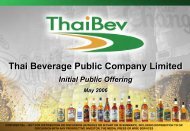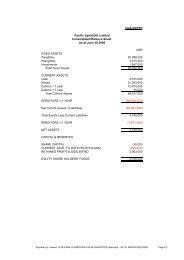PROSPECTUS THAI BEVERAGE PUBLIC COMPANY LIMITED ...
PROSPECTUS THAI BEVERAGE PUBLIC COMPANY LIMITED ...
PROSPECTUS THAI BEVERAGE PUBLIC COMPANY LIMITED ...
Create successful ePaper yourself
Turn your PDF publications into a flip-book with our unique Google optimized e-Paper software.
Part 2 Issuing CompanyThai Beverage Public Company Limitedand the Philippines have reduced their custom duties to 5% of the CIF value of the goods importedand Singapore has reduced its custom duty to zero. In addition, under the conditions for eligibility tothe reduced rate of custom of AFTA, at least 40.0% of the finished goods produced in countries thatsigned AFTA must contain local content. Most of the Company’s products use local content above thespecified requirements.The current focus of the Company’s export sales of beer and spirits is to place its productsinto Thai restaurants and modern-trade channels, such as retail stores. Typically, the Company sells itsproducts to beer and spirits distributors outside Thailand on an order-by-order basis. The Companydoes not enter into sole distribution agreements for particular countries. As of June 30, 2008, theCompany had more than 40 distributors of its beer and spirits products located in over 75 countries.The Company intends to establish trading and distribution companies in various countries that theCompany sells its products to increase sales volume and to promote brands in these countries.CompetitionBeer. The Company competes for market share with other brewers, primarily Boon RawdBrewery Co., through brand preference, distribution, product availability, pricing, packaging, andcustomer service. The Company introduced Chang Beer in 1995, and in 2007, the Company’s beerportfolio had a market share of 46.7% of the aggregate beer market in Thailand.Boon Rawd Brewery Co. launched its Leo brand in 1998, which was targeted at the samesegment as Chang Beer, but was a low-priced alternative to its flagship Singha brand. In 2004, Leobrand captured more market share due to changes in consumer preference towards lower alcoholcontent beer and, as a result, the volume of beer the Company sold in 2004 decreased compared tothat in 2003. The Company subsequently launched its Archa Beer brand in July 2004 to competedirectly against Leo and maintained its Chang Beer as the market leader in the economy segment.Competition in the economy segment of the beer market between the Company and Boon RawdBrewery Co. has stimulated volume growth in the market. Such competition leads to the emergence ofnew brands, more competitive marketing strategy and greater packaging diversity.The entry into the beer market by new competitors or the expansion of the existingcompetitors’ product variety could reduce the Company’s market share, or affect the Company’ssuccess in expanding its existing and future products into higher-priced segments of the market.However, the Company believes that there are significant entry barriers to domestic market. Suchbarriers include the significant investment required to build a brewery, limited access to establisheddistribution channels and limited access to television and radio advertising due to the Government’sregulations.Spirits. Similar to beer market, spirits producers compete for market share with other spiritsbrands, primarily imported brands, through brand preference, distribution, product availability,pricing, product packaging and customer service.The Company’s primary competitors in the white spirits and Chinese herb spirits segment areillegal producers and local “homemade” producers of community white spirits. Community spirits arewhite spirits with alcohol content between 15 and 40 degrees, usually produced from rice, flour, fruit,or other agricultural products. The Company generally does not regard these community spiritsproducers as a threat to the Company’s market share due to their limited size and distribution ability,inconsistent quality and lack of brand awareness in their respective market.Furthermore, the Company may have to compete with new spirits producers such asHao Dong and Hao Fai white spirits, which are produced by Thai Ginebra Trading Co. The Companyprimary competitors in the brown spirits segment are low-priced imported spirits brands, including100 Pipers (produced by Pernod Ricard) and Benmore (produced by Diageo Plc.). These rival brandsare primarily blended Scotch whiskies or admix whiskies. Such spirits are blended from aged maltPart 2 Page 48


